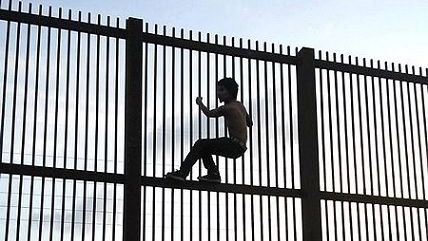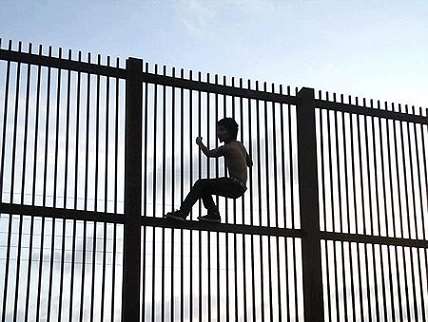What Kind of Smaller Immigration Deal Could Pass Congress?
Think small, get something done


Immigration reform has been on President Obama's election since it was deployed in 2012 to shore up support among Latino voters. Congress spent much of its working 2013 on legislation that ended up topping 1,000 pages, largely because, as Sen. Lindsay Graham (R-SC) noted supportively, lobbyists keep coming to legislators for more carve outs. So a bill theoretically about legal status for illegal immigrants becomes a bill about border security, jobs, employment verification, subsidies, and who knows what else. It shouldn't come as a surprise that such a monstrosity is having trouble getting passed. House Republicans are currently working on unveiling an outline of broad immigration reform principles.
Obama's decision not to prioritize immigration reform during his first term also lowered the odds it would pass. George W. Bush's similar effort at the end of his term also failed. An unpopular president can have the effect of making popular legislation easier to oppose. Bush's efforts were torpedoed by a coalition of conservative Republicans and liberal Democrats, including Obama himself, who as a senator in 2007 helped the attempt at immigration reform fail by pushing pro-union amendments that would weaken the bill and its support.
Most of the senate's current immigration reform bill and previous iterations is concerned with issues other than the human factor in the issue. While I've argued previously for amnesty for illegal immigrants, that solution is a non-starter in the current political climate. Nevertheless, perhaps a smaller, more focused bill that deals with the human cost of poor immigration policy would have a better chance of passing. Such a bill would not have to include e-verify, deal with any agricultural work specifically, or reform border security.
What it would have to do is provide some kind of legal status for the nations 7+ million illegal immigrants, the vast majority of whom are otherwise law-abiding. Crossing the border illegally, after all, is merely a misdemeanor. Opponents of immigration reform, including some legal immigrants themselves, complain that illegal immigrants didn't "wait in line" like everyone else. That line should be cut as part of immigration reform. Entering the country legally ought to be simpler for those seeking to immigrate to the US that have the means to do so. Concerns about illegal immigrants seeking to abuse the welfare system are largely unfounded, but could be alleviated by offering expedited legal status for illegal immigrants willing to forgo access to the welfare system. Every illegal immigrant I know (quite a few) has said something along those lines; they want to be legal in this country and couldn't care less about getting welfare. They want to work, and ought to be allowed to. To that end, immigration reform should make it easier for employers to hire the employees they want without having to worry about running afoul of immigration law. If this kind of narrower immigration reform couldn't garner the support it needs to pass, reform supporters ought to consider a concession that could dampen opposition: making it easier to deport illegal immigrants convicted of violent crimes, and perhaps even banning such immigrants from ever returning to the US. Again, most illegal immigrants would be ok with this: they are law-abiding people just as upset by illegal immigrants who drink and drive and hit and run as legal immigrants and US citizens are.
Getting immigration reform passed in a divided, hyperpartisan Washington where each side is mostly interested in demonizing the other is a difficult task. When it is in the form of a 1000+ page bill that looks and feels like a clusterfuck that expands the power of the federal government while promoting more profligate spending and ignoring the actual human beings it is theoretically supposed to help, it's an impossible one.
Editor's Note: As of February 29, 2024, commenting privileges on reason.com posts are limited to Reason Plus subscribers. Past commenters are grandfathered in for a temporary period. Subscribe here to preserve your ability to comment. Your Reason Plus subscription also gives you an ad-free version of reason.com, along with full access to the digital edition and archives of Reason magazine. We request that comments be civil and on-topic. We do not moderate or assume any responsibility for comments, which are owned by the readers who post them. Comments do not represent the views of reason.com or Reason Foundation. We reserve the right to delete any comment and ban commenters for any reason at any time. Comments may only be edited within 5 minutes of posting. Report abuses.
Please to post comments


Well, given the huge popularity of Peter Dinklage these days, I'm not surprised that a smaller immigrant bill might get through.
Green cards - have them cost $1000 initially, and $250 every year. Citizenship is available after ten years of felony-free residence.
Whew. That was tough.
Felony-free, welfare-free residence.
Yeah, I thought that was implied. A green card is a residence permit for work, and should be revoked if the person applies for welfare.
And no noncitizen voting, please, thanks.
That's it? IIRC, Costa Rica used to take a $50000 bond for 10 years if you wanted to be a citizen and double that if you wanted to work during that time. Surely American citizenship is worth a similar amount.
You could add an "immigrant tax" of 2.5% of their income or something. If it's too high, lefties will reject because poor farm workers! If there's no cost, conservatives will reject it because drain on the system!
"making it easier to deport illegal immigrants convicted of violent crimes, and perhaps even banning such immigrants from ever returning to the US."
This sounds like it ought to be a stand-alone law. Why should it be part of a Grand Compromise? That would suggest that it's a reluctant concession on the part of a political faction. So which faction would be conceding a point by making the deportation of such people easier?
There are a couple possibilities. Either it's overly punitive, in which case it shouldn't pass, or it's a good idea. In the latter case, who is actually going to stand up and say, "look, guys, if you make the laws friendlier to law-abiding immigrants, I will do you a favor and let you deport illegals who do violent crimes!"
Blue cards - give them to anyone who passes a background check. No path to citizenship. No welfare for you or your children -- even citizen children.
Whew. Easiest ever.
Or even so easy a 5-year-old could do it: NO WELFARE.
At all.
For anyone.
None.
Yeah. I think State out of welfare would solve a shit-ton of the structural problems with the US government. Forcing prosecutors to prove harm to a 2nd party for criminal conviction resulting in more than a fine not to exceed $1000 or a sentence not to exceed 10 days would fix most of the rest.
No welfare for you or your children -- even citizen children.
That will never fly. And I don't think it should. For one thing, there is this thing called the 14th amendment. You can't create separate classes of citizenship. I'm all for no welfare for non-citizen immigrants, but a citizen is a citizen.
Then where the hell is my welfare?
Or where is the welfare of someone who has run out of their allotted time on welfare?
Welfare is heavily laden with requirements, restrictions, and provisos. Adding one that says "a minor child is not eligible for welfare if his parents are not" is not a significant addition.
How about an immigration bill to actually enforce all the immigration laws that have been in effect since the 1986 amnesty?
After all the other side got not only amnesty but twice the numbers projected along with lots of smaller amnesty's since then along with deliberate non-enforcement of immigration laws by the administration and actual legal action against states and localities that tried to enforce them.
And during this time the US has had the largest numbers of legal immigrants and legal residencies of all the countries of the world
I would suggest intentionally tanking the economy to decrease demand but so many countries are too far ahead of us already.
Exhibit A: Venezuela!
Here's an observation:
Most illegals working in Jersey earn more than Obama's proposed $10.10 minimum wage already. I don't employ people myself, but I've had sub-contractors hire illegals and we've had conversations about compensation. A semi-skilled day laborer earns $100 a day. Semi-skilled means no specific trade skills but experience working as a day laborer. They have no "protections", but what minimum wage worker has any type of protection beyond work place safety stuff?
It seems to me, in terms of earning potential, it's better to work off the books. No earned income tax credit, unemployment benefits, or SS and Medicare eligibility, of course, but no FICA either.
Are small employers and immigrants (whether or not they're legal) really going to give up off the books employment? Who needs the hassle of regulation for no benefit?
An employer can hire people to work off the books if his customers pay him cash. Otherwise, the employer cannot deduct the cost of paying his employees, and would have to pay income tax on that money himself or show it as some other business expense and hope he doesn't get audited.
The Mexican-American War of 1846-1848 has come home to roost.
Since probably a lot of opposition to immigration is racially and/or ethnically based, and since immigration from wherever is generally a good thing, why not compromise by increasing and/or easing immigration allowances while racially or ethnically restricting them? That way we can have more immigrants in total while not bothering xenophobes as much.